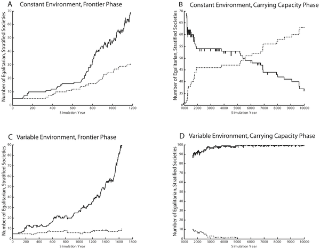9
The causes of socioeconomic inequality have been debated since the time of Plato. Many reasons for the development of stratification have been proposed, from the need for hierarchical control over large-scale irrigation systems to the accumulation of small differences in wealth over time via inheritance processes. However, none of these explains how unequal societies came to completely displace egalitarian cultural norms over time. Our study models demographic consequences associated with the unequal distribution of resources in stratified societies. Agent-based simulation results show that in constant environments, unequal access to resources can be demographically destabilizing, resulting in the outward migration and spread of such societies even when population size is relatively small. In variable environments, stratified societies spread more and are also better able to survive resource shortages by sequestering mortality in the lower classes. The predictions of our simulation are provided modest support by a range of existing empirical studies. In short, the fact that stratified societies today vastly outnumber egalitarian societies may not be due to the transformation of egalitarian norms and structures, but may instead reflect the more rapid migration of stratified societies and consequent conquest or displacement of egalitarian societies over time.



” sequestering mortality in the lower classes” may be the worst euphemism I’ve ever read.